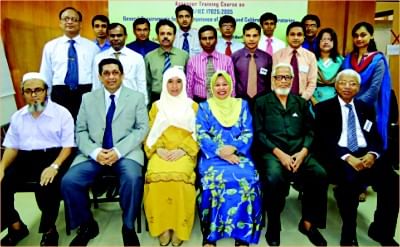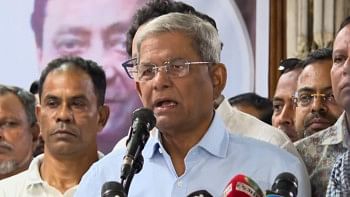Accreditation board upgraded

Md Moinuddin Miazee, seated second from right, chairman of Bangladesh Accreditation Board (BAB), and Md Abu Abdullah, seated second from left, director general, pose with the trainers and participants of assessor training, organised jointly by BAB and UNIDO, in the capital recently. Photo: BAB
Bangladesh Accreditation Board (BAB), an autonomous agency, is well-prepared to provide accreditation in accordance with international standards, its top official said.
BAB is the national authority with responsibility of accreditation in Bangladesh. It offers accreditation programmes for various types of conformity assessment bodies, such as laboratories, certification bodies, inspection bodies, training institutions or persons in accordance with the relevant International Organisation for Standardisation (ISO), International Electro technical Commission (IEC), and other regulatory standards and national standards.
BAB is the statutory body established in 2006 as an autonomous organisation responsible for upgrading the quality assurance infrastructure and conformity assessment procedures in Bangladesh and enhancing the recognition and acceptance of products and services in international, regional and domestic markets.
Md Abu Abdullah, director general of BAB, said the country's businessmen after being provided with necessary accreditation would feel more acceptable by their international buyers. It will widen their business network, he said.
The official said the BAB will provide accreditation normally for two years. Towards the close of the accreditation period, the companies would have to reapply for extension. “We would also conduct spot visits to inquire whether the company is complying and maintaining agreed standard.”
The BAB in its turn is assessed by some international organisations such as International Laboratory Accreditation Cooperation (ILAC), Asia Pacific Laboratory Accreditation Cooperation (APLAC) and the Pacific Accreditation Cooperation (PAC).
“The membership of these international bodies will help promote acceptance of reports issued by the organisations accredited by the BAB,” said Abdullah.
Accreditation is a third party attestation related to a conformity assessment body conveying formal demonstration of its competence to carry out the tasks of conformity assessment. It is made available to different conformity assessment bodies namely testing and calibration laboratories, certification bodies, inspection bodies, training institutions and persons who perform conformity assessments.
Abdullah said accreditation is an essential tool for the businesses for decision-making and risk management. Organisations can save time and money by selecting an accredited and competent supplier. Accurate measurements and tests carried out in compliance with best practices limit product failure and down time and control manufacturing cost.
“Accreditation to internationally recognised standards can provide a competitive advantage and facilitate access to export markets worldwide. Using an accredited body to carry out an independent evaluation helps demonstrate due diligence in the event of legal action.”
He said accreditation gives consumers confidence in an ever increasingly complex, dynamic and global marketplace by ensuring consistently high standards in the quality of products or services purchased.
“Consumers will not know whether every product in the local, national and global society is of standard quality. If he sees the mark or logo of accreditation he would feel more satisfied.”
He said it is also important for accredited organisations. “In a number of areas, it is a requirement to obtain accreditation before offering certain services; in others it is a de facto 'licence' to trade.”
He said accreditation provides market differentiation and objective proof that an organisation complies with best practice. The internationally recognised system is used to develop and sustain high standards of performance. It is a winning formula for eligibility to tender and for international trade.
Although the government set up the BAB five years ago, the authorities did not deploy enough manpower to carry out the activities. Before the joining of the current director general, only three people used to run the office.
“I have been in the office for a year. I hired more than 15 people, both at officers and employees level, to make the institution dynamic. We have recruited talented people and have given them proper training both at home and abroad. I think with current manpower we will be able to carry out our work,” he said.
He said Bangladesh has some quality laboratories. “We have some medium quality and lower quality laboratories too.”
Abdullah said in many countries there are accreditation bodies for both national and international standards. “In Bangladesh, this is all for international standard.”
He said parties would come from outside the country to have accreditations that Bangladesh can provide services at cheaper rates. “Our services are very cheap. We are also targeting our export markets.”
“Till today, our exporters and businessmen have been seeking certificates from some neighbouring countries as well as other countries. For this they have to pay more and spend a lot of time.”
“If we can ensure the availability of the internationally accepted certificates then it will be much cheaper for them and it should take much less time. It will be easier from them.”
“For example, currently, it costs over Tk 2 lakh to get accreditation in the neighbouring country. But in Bangladesh it will not be more than Tk 2 lakh.”
He said BAB would certify some bodies that will test and accredit products and services.
The BAB now plans to apply for International Accreditation Forum (IAF) membership in November this year.
He said their target is to make available the services for the laboratories and citizens of the country. “We are planning to hold seminars and sessions to make stakeholders aware of our services.”
“We are also working to create awareness of the BAB activities and its importance among people as most of them do not know about it. We hope within the next few months we will be able to create much awareness among the people.”
“We will arrange seminars, discussions and workshops. We also need cooperation from the media to popularise the idea.”
The BAB now works on health accreditation and has already organised a seminar for the stakeholders, in efforts to improve the atmosphere in the country's medical laboratories and make them in line with international standards.
Abdullah said his organisation is stepping up efforts to give accreditation to some health laboratories, as Bangladesh has very few good laboratories.
The BAB is yet to give accreditation to any companies. But the statutory body has distributed application forms among some parties interested to be accredited. “Even one organisation from Kolkata has applied for accreditation. Anyone can be accredited anywhere in the world as the process is voluntary, not mandatory.”
There are 15 bodies that give certification in Bangladesh.
“The certificate will be adhered, acknowledged and accepted by other organisations around the world.”
“Our products as well as companies will get more acceptances if they are properly accredited. The country's exporters should get accredited in the best interest of the businesses.”

 For all latest news, follow The Daily Star's Google News channel.
For all latest news, follow The Daily Star's Google News channel. 



Comments